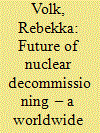| Srl | Item |
| 1 |
ID:
180092


|
|
|
|
|
| Summary/Abstract |
Over the next three decades, it is likely that on the order of 100 U.S. nuclear power reactors—almost the entire U.S. nuclear fleet, which at its peak in 1990 operated 112 commercial reactors—will be shut down and decommissioned. Decommissioning is a costly, time-consuming process that involves removing or decontaminating all radioactive infrastructure and related materials on site to prevent risks to public health so that the land can be safely used for other beneficial purposes. Though federal regulations have required that plant licensees prepare financially for this eventuality, we argue that particularly in light of commonly used corporate structures designed to strictly segregate financial risks, and under the current energy market conditions, the financial regulations in place may be insufficient in some exigent situations to ensure successful decommissioning. We explore available options for legal recourse if funding is inadequate in a corporate law context and pursuant to existing federal law. We comment on the possibility that taxpayers might be required to shoulder all or part of the financial liability at “legacy” plants in the absence of structural changes.
|
|
|
|
|
|
|
|
|
|
|
|
|
|
|
|
| 2 |
ID:
162925


|
|
|
|
|
| Summary/Abstract |
In the 1950s, nuclear power generation became important and many facilities were built. Today, because of political, technical or economic reasons many reactors are being or will be decommissioned. This highly impacts energy policy regarding future energy supply and the handling of decommissioning, including dismantling capacities, regulatory control, equipment, expertise, funding or final nuclear disposal sites.
|
|
|
|
|
|
|
|
|
|
|
|
|
|
|
|
| 3 |
ID:
171358


|
|
|
|
|
| Summary/Abstract |
With Germany's nuclear phase-out, 23 reactors need to be dismantled in the near future. Initiated by the difficult financial situation of affected utilities in 2014, a major discourse on ensuring financial liability led to a redistribution of liabilities and finances, with the utilities remaining in charge of dismantling, while liability for interim and final storage now transferred to the public. This paper assesses whether the new regulation is ultimately likely to be to the benefit of the public. It introduces a two-stage stochastic optimization framework encompassing the different dismantling phases, resulting waste flows and storage levels of low- and intermediate-level waste (LLW and ILW) as well as the associated costs. Results show that storage risk – proclaimed as a major barrier to efficient decommissioning – is not a major driver for the optimal decommissioning schedule. However, a delay of ten years might increase interim storage costs now borne by the public by over 20%. Lacking experience and handling capacity of the industry could significantly shrink the buffer currently included in utility funds in order to deal with dismantling uncertainties. Our analysis reveals the storage gate as the new crucial interface between utilities and the public storage provider.
|
|
|
|
|
|
|
|
|
|
|
|
|
|
|
|